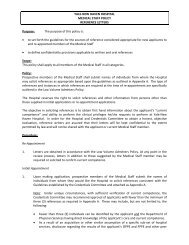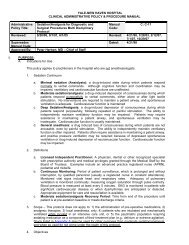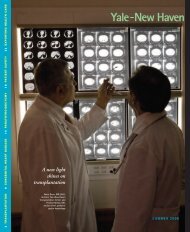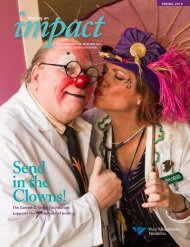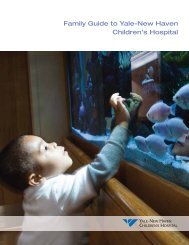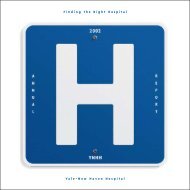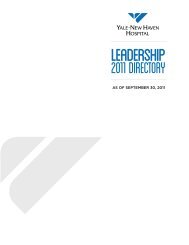Medical Staff Education Reading Materials - Yale-New Haven Hospital
Medical Staff Education Reading Materials - Yale-New Haven Hospital
Medical Staff Education Reading Materials - Yale-New Haven Hospital
Create successful ePaper yourself
Turn your PDF publications into a flip-book with our unique Google optimized e-Paper software.
STANDARD (BLOODBORNE PATHOGENS) PRECAUTIONS POLICY<br />
Scope: For the purpose of this document, the definition of Health Care Worker (HCW) is any person with patient contact,<br />
including but not limite d to: attending physicians, postdoctoral fellows, house staff, me dical students, physician assistants,<br />
nurse-midwives, and their trainees. Similar policies govern the activities of hospital employees and other CDC-defined HCWs.<br />
The <strong>Yale</strong>-<strong>New</strong> <strong>Haven</strong> <strong>Hospital</strong> Policy for Bloodborne Pathogens is in compliance with CDC /OSHA recommendations and<br />
mandates. The YNHH Infec tion Control Committe e endorses the CDC/OSH A recommendations for th e application of<br />
Standard Precautions (formerly referred to as Universal Precautions) to all patients, regardless of a patient's diagnosis, and to<br />
any materials or equipment contaminated by blood or body fluids during medical practice.<br />
All HCWs should be awar e of the documented routes of transmission of H IV, HBV, and H CV and pro tect themselves<br />
accordingly. Although nosocomial transmission of bloodborne pathogens is rare, Standard Precautions must be utilized in the<br />
care of ALL patients regardless of their diagnosis. This includes:<br />
1. Hands should be cleansed before and after contact with all patients using antiseptic soap and water or an alcohol-based<br />
hand rub. If hands or other bod y surfaces come in contact with blood or bo dy fluids, wash them immediately with<br />
antiseptic soap and water.<br />
2. Gloves should be worn when contac t is anticipated with blood or any body fluids except sweat. Gloves need not be worn<br />
in other ordinary patient care contact. Gloves should be discarded prior to leaving the patient's room and hands washed<br />
immediately after each patient encounter. Dou ble gloving may reduce the risk of b lood exposure when performing<br />
surgical procedures.<br />
3. Gowns/aprons, masks, and eye protection are indicated when there is a r isk of exposure to blood or body fluid through<br />
close contact, splashing, or aerosolization, such as in suctioning, endoscopy, surgery, delivery (vaginal or C-section) and<br />
catheterization.<br />
4. Do not recap needles/syringes. Discard used, uncap ped needles/syringes and sharps (scalpels, forceps, razors, trocars,<br />
etc.) in a puncture-resistant container specified for this purpose. Containers (sharps boxes) are located in all p atient<br />
rooms and treatment rooms.<br />
5. Eating, drinking, applying cosmetics, lip balm, or handling contact lenses is prohibited in clinical patient care areas.<br />
6. When significant exposure to blood or body fluid occurs (e.g. needlestick, mucous membrane splash, or contact with nonintact<br />
skin), report the incident IMMEDIATELY to a hospital supervisor, and go to the YNHH Occupational Health Service<br />
located in suite 130 o f the Grace Building for evaluation and recommendations for post-exposure prophylaxis and followup.<br />
If the exposure occurs after hours or on a weekend, go to the <strong>Yale</strong>-<strong>New</strong> <strong>Haven</strong> <strong>Hospital</strong> Emergency Department for<br />
evaluation. Bloodborne pathogen exposures should be evaluated immediately so that a decision can be made within 1-2<br />
hours of e xposure whether to admin ister antiretroviral and/or Hepatitis B prop hylactic treatment. This includes those<br />
persons previously immunized with the Hepatitis B vaccine. A YNHH Supervisor's Report of Employee Accident/Injury<br />
(F1797) form should be completed for all significant exposures. YNHH Occupational Health Services should be notified of<br />
each incident REGARDLESS of the health care worker's usual source of medical care. Questions concerning reporting<br />
and follow-up can be directed to YNHH Occupational Health Services (688-2462). Post-exposure evaluation may include<br />
periodic blood testing.<br />
In many cases, blood testing of the source patient is also indicated. If the source patient does not consent to such<br />
testing, Connecticut State law details a specific process for determining the patient’s bloodborne pathogen infection<br />
status. This process includes consultation with a review committee, which is appointed by the Chief of <strong>Staff</strong>.<br />
Questions concerning this procedure should be directed to the Chief of <strong>Staff</strong>'s office or Legal Affairs.<br />
7. Using the above criteria as guidelines, appropriate clinical judgment should be used when determining which protective<br />
barriers (i.e. personal protective equipment) are needed. Each area must establish its own standards for consistent use of<br />
OSHA-required protective barriers; these unit s tandards should be based o n the health care worker's skills and the<br />
reasonable possibility of contact with the patient's blood or body fluids, non-intact skin, and mucous membranes.<br />
2


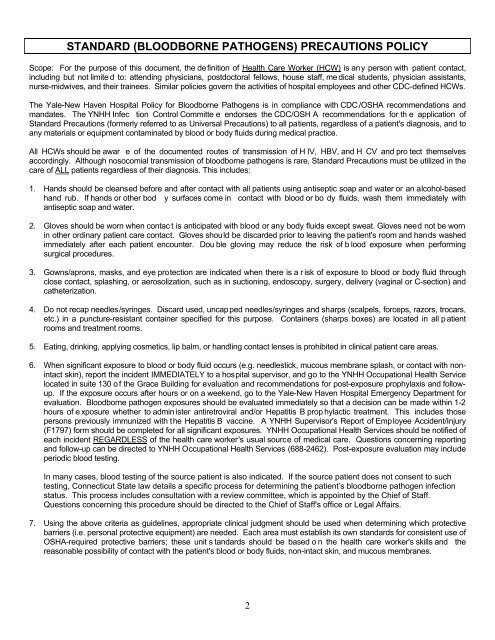
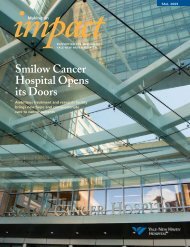

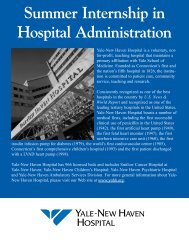
![Annual Report Donor Listings [pdf] - Yale-New Haven Hospital](https://img.yumpu.com/49673575/1/190x245/annual-report-donor-listings-pdf-yale-new-haven-hospital.jpg?quality=85)

